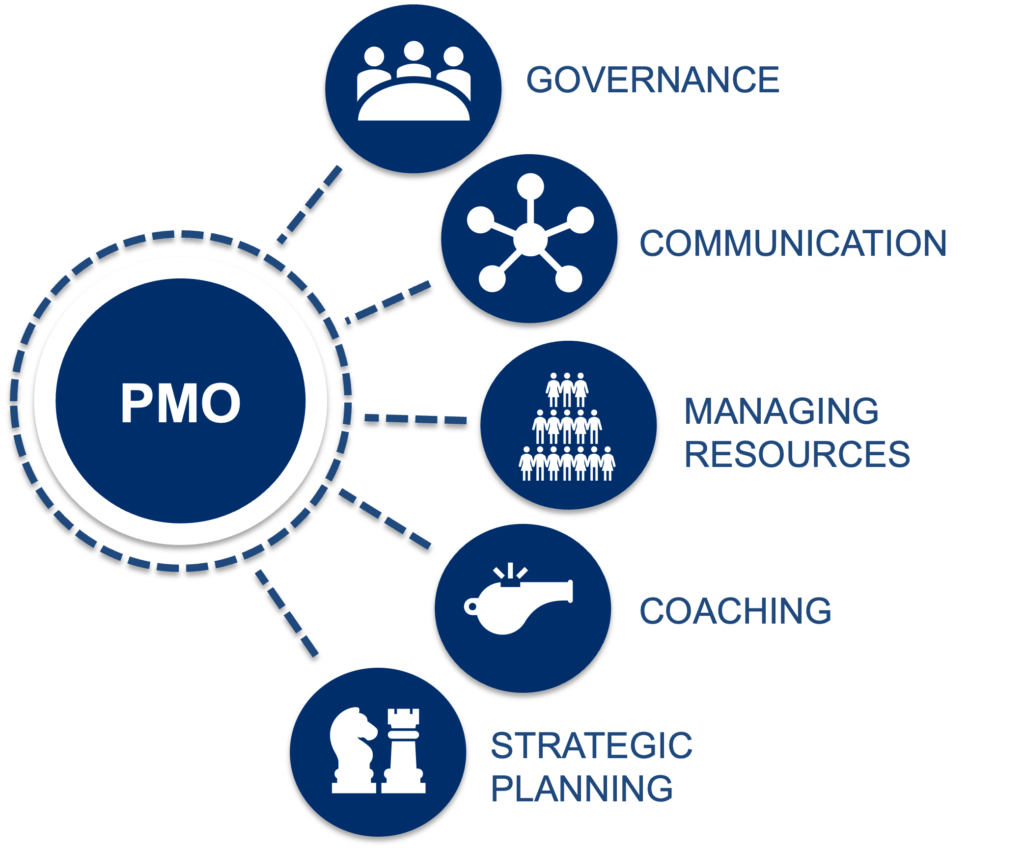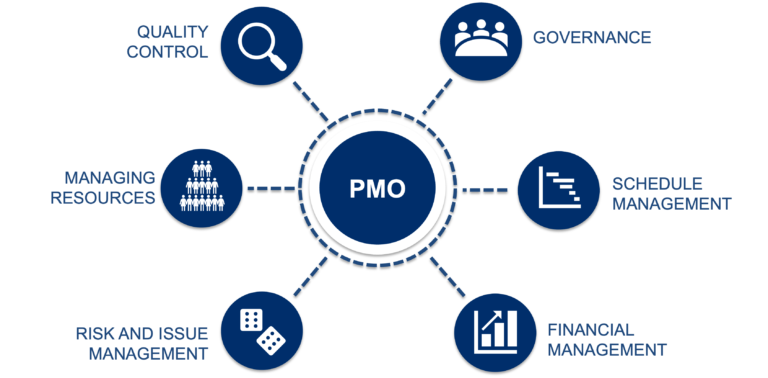Definition of PMO
The acronym PMO can stand for “Project Management Office” and refer to the activity of project portfolio management, but it can also stand for “Project Management Officer” and refer to the manager in charge of the project portfolio. While it is clear that these two definitions go hand in hand, for the purposes of this article we will focus on the latter meaning when we talk about the PMO.
The PMO plays a key role in project management within an organisation. They are responsible for supervising, coordinating, prioritising and setting strategic priorities for the various projects in order to quickly achieve the objectives set. They are responsible for governance and steering, and are involved at various stages of the project using a range of planning and assessment methodologies and tools to manage and monitor the project effectively. They also have an important communication role as they are responsible for communicating the progress of projects to the various stakeholders.
The role of the PMO
The Project Management Officer wears many hats, and in general, they must have an overview of the project(s) in progress. They must ensure that each project is carried out strategically and does not lose sight of its objectives. Throughout the process, the PMO should be able to:
- Ensure the relevance of each project defined
- Manage and prioritise projects, or pause certain projects
- Allocate the necessary human and material resources to the project
- Accompany, support and train the project managers
- Use tools such as dashboards and Gantt charts as well as project management software to provide an overview (Microsoft Project, Project Online, Oracle Primavera P6, Oracle Primavera Cloud, Planisware, etc…)
- Manage risks, anticipating them and making strategic plans
- Monitor costs, deadlines and project performance
- Report by providing regular feedback to all stakeholders
The three types of PMO
There are three types of Project Management Officer:
- The Operational PMO: is attached to a single project and helps the project manager to manage the operational aspects of the projects. They provide management tools such as dashboards, project management software and methodologies to help project managers plan, organise, monitor and control their projects.
- The Central PMO: as the name suggests, they are at the centre of various projects. In charge of the project portfolio, they play a key role in planning, implementing processes and reporting. They are also responsible for monitoring project budgets.
- The Strategic PMO: is attached to a specific department of a company or organisation. Their aim is to manage work teams in order to achieve defined objectives. Risk management is also one of their missions, which means that they must assess the strategic risks of current projects.

The impact of the PMO on project management
PMO Project Management centralises and streamlines project management processes. They play a global role in all phases of the project. Their impact on project management is therefore decisive.
Productivity
The PMO helps to improve productivity. They optimise workflows by identifying inefficiencies and putting in place processes for improvement. They standardise methods and use project management tools to facilitate task completion and follow-up.
Control of costs and deadlines
The PMO ensures that costs and deadlines are kept under control. They minimise risks through effective management of human, financial and material resources. They closely monitor deadlines and implements corrective measures to remedy any delays. They can also make changes to the budget to avoid overspending.
Project quality
The PMO ensures that each project meets a high standard of quality. By monitoring the execution of projects, the PMO ensures that they comply with established objectives and standards. By dealing effectively with risk management, they help to reduce problems and failures. By providing ongoing support and training for project managers, the PMO strengthens the skills of the teams and thus the quality of the deliverables.
Project consistency
The PMO ensures that each project is fully consistent with the organisation’s strategic objectives. They are therefore involved in the selection of relevant projects and ensures satisfactory results through precise, ongoing monitoring. The PMO is also responsible for communication between all stakeholders to ensure that the project and its challenges are fully understood by the team.
Choosing PROPRISM as your PMO
PROPRISM deploys its expertise in Project Management Office PMO to offer you solutions tailored to the governance of your projects. We have a team of experts capable of improving the quality of your projects, promoting productivity and strategic alignment, as well as reducing costs and ensuring deadlines. PROPRISM operates in the pharmaceutical, marine, construction, engineering, transport and infrastructure, and chemical industries.
Our experts play a key role in the success of your projects. Their experience is employed to ensure that resources are properly allocated and that budget forecasts are adhered to. Using agile methods and project management tools that encourage adaptability and responsiveness to change, they encourage improvement and productivity in project management. PROPRISM also plays an essential role in providing advice and assistance, and supports your teams throughout the project life cycle with ongoing training. We also ensure coordination and motivation throughout the project to guarantee its success. Thanks to our solid expertise and essential teamwork, we can work with you to make your projects successful.




